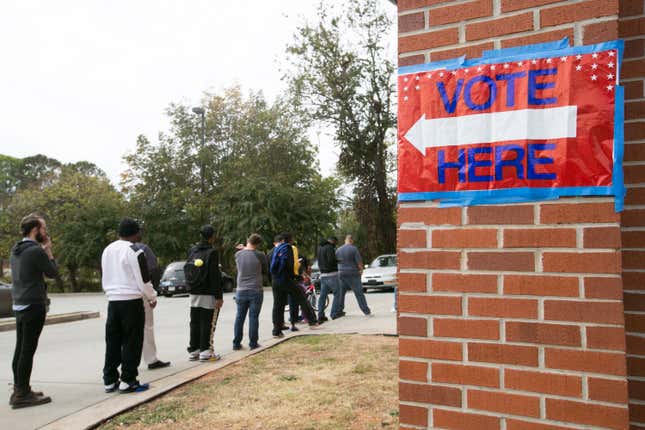
A Wisconsin judge ordered the state’s Elections Commission to strike more than 200,000 voters from its rolls after they did not respond to a mailer asking them to verify their address within 30 days.
The decision may force the crucial swing state to throw out hundreds of thousands of registrations before the 2020 election (the bipartisan commission previously planned to toss them out in April 2021, according to the Milwaukee Journal Sentinel).
The news comes alongside major voting issues cropping up in Ohio, another swing state, and Georgia, which has grown increasingly purple in the last few major elections. In the Peach State, the voting rights group Fair Fight Action (founded by former gubernatorial candidate Stacey Abrams) filed a motion Monday asking a court to halt the scheduled purging of inactive voter registrations. More than 300,000 registrations are at risk, reports WGMT-TV, and, just as in Wisconsin, the registrants have been earmarked because they didn’t respond to an election mailer within a 30-day timeframe. Meanwhile, in Ohio, an Associated Press review found thousands of absentee applications were denied last year because of missing or mismatched signatures. The state’s 2018 elections featured races for governor, state Supreme Court, and Congress.
The issue of voting rights is slated to be a major one in 2020, particularly given its impact on the 2016 presidential election and on several state races in 2018. As the Washington Post notes, Donald Trump won Wisconsin by a hair: fewer than 23,000 votes, just 1/10th the number of registrations ordered to be struck last week. Abrams lost her bid for Georgia’s governorship by less than 55,000.
In Wisconsin, Democratic strongholds will be disproportionately hit by Ozaukee County Judge Paul Malloy’s decision according to an analysis run by the Milwaukee Journal Sentinel, including Milwaukee, Madison, and college towns (places that also have a more housing fluidity than other areas).
According to the Post, the Elections Commission wanted to wait until after April 2021 to clean up the rolls:
[The commission] argues that the law gives it the power to decide how to manage the voter registration list. It wants to wait until after the April 2021 election before removing anyone, citing concerns that everyone identified may not have moved and removing them would create confusion.
The commission also argued that leaving a registered voter on the polls, even if they have moved, does not mean they will actually commit fraud by voting at their old address.
The elections commission decided to wait longer than 30 days to deactivate voters because of problems in 2017 after about 343,000 voters were flagged as potential movers. More than 300,000 people who did not respond were deactivated, leading to confusion, anger and complaints. Wisconsin allows same-day voter registration, but it requires photo ID and proof of address.
And while the presidential election is on the forefront of everyone’s minds come 2020, there are other major races slated to come before Wisconsin voters before then: a February primary for a seat on the state Supreme Court (which the Chicago Tribune describes as “highly partisan”), and the April presidential primary.
Bipartisan support for increasing access to the polls was also felt in Ohio, where some lawmakers faulted the absentee ballot registration process (which cannot be completed online) with causing problems.
Said Republican Secretary of State Frank LaRose, “Election integrity and voter access can certainly coexist, so let’s work together to modernize the process so we can improve the antiquated system currently in place.”

